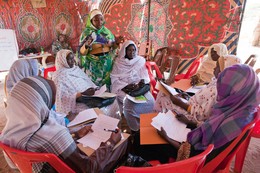Mirko Tobias Schäfer / Assistant Professor
University of Utrecht Department for Media and Culture Studies
Mirko Tobias Schäfer / Assistant Professor
University of Utrecht Department for Media and Culture Studies
Conflicts affect women differently than men. Women almost never take part in the actual fighting but their bodies often become part of the battlefield as sexual harassment, rape and slavery are routinely part of combat activities. Their children might be pressed into service within the various fighting groups. In war ridden areas it is often up to women to upheld basic infrastructures and provide the necessities for mere survival. Not the men or the combatants but women are crucial in restoring peace, solving conflicts and rebuild societies. Their contribution in conflict resolution matters. This special role and the importance of women participation in peace-building processes has been officially recognized through the UN resolution 1325. Adopted in 2000, it is the very first document that forces parties in post-conflict reconstruction to respect women rights and to ensure their participation in peace negotiations and conflict solving.
Research shows that women are specifically affected through conflicts and research has also pointed out the crucial role women play in building peace and restoring society in post-conflict areas. However, this research often remains anecdotal and limited to case examples. Quantitative analysis or the combination of various data sets as well as employing techniques of data visualization are often not applied. CoolPolitics and the Utrecht Data School want to change this through hosting a masterclass on data journalism. Using open data from the World Bank, the African Development Bank, the Guardian Open Platform and others, the participants can verify the qualitative research on women as peace builders. This masterclass provides a data-driven approach in mapping social interaction, economic context and political development in post-conflict areas.
The masterclass is open to students of conflict studies, media studies and gender studies as well as a broad general audience. A lecture series will provide an introduction to the issue of women, peace and security. Lectures are provided by scholars from conflict studies, gender studies as well as practitioners from the development-aid sector. Trainings in techniques of data analysis, data visualization and writing journalistic articles teach participants to turn information into accessible articles that inform the broader public. This interdisciplinary initiative allows the participation of students, scholars as well as professionals who want to learn about data journalism and women, peace and security. Each team will select a data set during a hackathon and start developing research questions which will then be addressed through analyzing the data set. Using network visualization tools such as Gephi, tools such as Google Fusion Tables, Crowdmap and others, participants turn their findings into informative visualizations. A training in presentation and writing helps to develop accompanying articles to bring the findings to the attention of larger audiences.
Schedule & Registration
All lectures and trainings will take place at Utrecht University on Tuesday evening and Friday. The Tuesday evening sessions are scheduled to last three hours and the Friday sessions eight hours.
Tuesday 4 February (evening)
Friday 7 February
Tuesday 11 February (evening)
Friday 14 February
Tuesday 18 February (evening)
Friday 21 February
Tuesday 25 February (evening)
Friday 28 February
Tuesday 4 March (evening)
Friday 7 March
Tuesday 11 March (evening)
Friday 14 March
Tuesday 18 March (evening)
Friday 21 March
Tuesday 25 March (evening)
Friday 28 March
Tuesday 1 April (evening)
Friday 4 April
Tuesday 8 April (evening)
Participants work in teams on assignments. Participants are expected to attend to all lectures and to participate actively in group work and discussion.
The data school will start in February 2014 with lectures on Tuesdays and Fridays. Registration for students of Utrecht University is possible by e-mail to Lisette [at] dataschool [dot] nl
The Utrecht Data School is a platform for explorative data analysis. It is an interdisciplinary effort of scholars from new media studies cooperating with colleagues from Geosciences, Government Studies and Computer Science. In cooperation with partners from business, government and NGO's students analyze case examples and provide a fresh view upon data sets in an extended 'hackathon' fashion. The research projects are commissioned by external partners who are interested in new ways of looking into data.
Photo credit: UNAMID, women in North Darfur attending a workshop on Resolution 1325
Date December 2013 Category News

Women are crucial in post-conflict reconstruction. They are needed in processes of peace building and peace keeping as research findings support. Often these findings are based on anecdotal and qualitative research. CoolPolitics and the Utrecht Data School received a grant by the Oxfam Novib's Women Peace and Security Program to explore ways of open data and big data research to map the specific role of women in post conflict reconstruction.